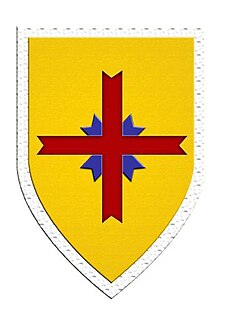
Article One of the United States Constitution establishes the legislative branch of the federal government, the United States Congress. Under Article One, Congress is a bicameral legislature consisting of the House of Representatives and the Senate. Article One grants Congress various enumerated powers and the ability to pass laws "necessary and proper" to carry out those powers. Article One also establishes the procedures for passing a bill and places various limits on the powers of Congress and the states from abusing their powers.

The National Guard is a state-based military force that becomes part of the reserve components of the United States Army and the United States Air Force when activated for federal missions. It is a military reserve force composed of National Guard military members or units of each state and the territories of Guam, the Virgin Islands, Puerto Rico, and the District of Columbia, for a total of 54 separate organizations. It is officially created under Congress's Article 1 Section 8 ability to 'raise and support armies'. All members of the National Guard are also members of the organized militia of the United States as defined by 10 U.S.C. § 246. National Guard units are under the dual control of the state governments and the federal government.

The Posse Comitatus Act is a United States federal law signed on June 18, 1878, by President Rutherford B. Hayes which limits the powers of the federal government in the use of federal military personnel to enforce domestic policies within the United States. The Act was passed as an amendment to an army appropriation bill following the end of Reconstruction and was updated in 1956 and 1981.

Rudolph George Perpich Sr. was an American politician and the longest-serving governor of Minnesota, serving a total of just over 10 years. A member of the Democratic-Farmer-Labor Party, he served as the 34th and 36th Governor of Minnesota from December 29, 1976, to January 4, 1979, and again from January 3, 1983, to January 7, 1991. He was also the state's only Roman Catholic governor and the only one to serve non-consecutive terms. Before entering politics, he was a dentist.

The federal government of the United States is the national government of the United States, a federal republic in North America, composed of 50 states, a city within a federal district, five major self-governing territories and several island possessions. The federal government, sometimes simply referred to as Washington, is composed of three distinct branches: legislative, executive, and judicial, whose powers are vested by the U.S. Constitution in the Congress, the president and the federal courts, respectively. The powers and duties of these branches are further defined by acts of Congress, including the creation of executive departments and courts inferior to the Supreme Court.

In the United States, state defense forces are military units that operate under the sole authority of a state government. State defense forces are authorized by state and federal law and are under the command of the governor of each state.
The Uniform Code of Military Justice is the foundation of military law in the United States. It was established by the United States Congress in accordance with the authority given by the United States Constitution in Article I, Section 8, which provides that "The Congress shall have Power....To make Rules for the Government and Regulation of the land and naval forces".
The powers of the president of the United States include those explicitly granted by Article II of the United States Constitution as well as those granted by Acts of Congress, implied powers, and also a great deal of soft power that is attached to the presidency.

The militia of the United States, as defined by the U.S. Congress, has changed over time. During colonial America, all able-bodied men of a certain age range were members of the militia, depending on each colony's rule. Individual towns formed local independent militias for their own defense. The year before the US Constitution was ratified, The Federalist Papers detailed the founders' paramount vision of the militia in 1787. The new Constitution empowered Congress to "organize, arm, and discipline" this national military force, leaving significant control in the hands of each state government.
The Appointments Clause of Article II, Section 2, Clause 2, of the United States Constitution empowers the President of the United States to nominate and, with the advice and consent (confirmation) of the United States Senate, appoint public officials. Although the Senate must confirm certain principal officers, Congress may by law invest the appointment of "inferior" officers to the President alone, or the courts of law, or the heads of departments.

In United States law, a federal enclave is a parcel of federal property within a state that is under the "Special Maritime and Territorial Jurisdiction of the United States". In 1960, the year of the latest comprehensive inquiry, 7% of federal property had enclave status. Of the land with federal enclave status, 57% was under "concurrent" state jurisdiction. The remaining 43%, on which some state laws do not apply, was scattered almost at random throughout the United States. In 1960, there were about 5,000 enclaves, with about one million people living on them. While a comprehensive inquiry has not been performed since 1960, these statistics are likely much lower today, since many federal enclaves were military bases that have been closed and transferred out of federal ownership.

The Puerto Rico State Guard (PRSG) —Spanish: Guardia Estatal de Puerto Rico— is the state defense force of Puerto Rico that operates under the sole authority of the governor of Puerto Rico who, in turn, delegates such authority to the Puerto Rico Adjutant General. The Guard's secondary purpose is to assume the state mission of the Puerto Rico National Guard in the event that the National Guard is mobilized. The first incarnation of the PRSG was created in 1941 in response to World War II and it disbanded in 1946. The PRSG is one of the few state defense forces of the United States that has an air division.

In the United States, a state is a constituent political entity, of which there are currently 50. Bound together in a political union, each state holds governmental jurisdiction over a separate and defined geographic territory where it shares its sovereignty with the federal government. Due to this shared sovereignty, Americans are citizens both of the federal republic and of the state in which they reside. State citizenship and residency are flexible, and no government approval is required to move between states, except for persons restricted by certain types of court orders.
Keller v. State Bar of California, 496 U.S. 1 (1990), was a case in which the Supreme Court of the United States held that attorneys who are required to be members of a state bar association have a First Amendment right to refrain from subsidizing the organization’s political or ideological activities.

In United States law, the federal government as well as state and tribal governments generally enjoy sovereign immunity, also known as governmental immunity, from lawsuits. Local governments in most jurisdictions enjoy immunity from some forms of suit, particularly in tort. The Foreign Sovereign Immunities Act provides foreign governments, including state-owned companies, with a related form of immunity—state immunity—that shields them from lawsuits except in relation to certain actions relating to commercial activity in the United States. The principle of sovereign immunity in US law was inherited from the English common law legal maxim rex non potest peccare, meaning "the king can do no wrong." In some situations, sovereign immunity may be waived by law.
United States v. Locke, 529 U.S. 89 (2000), was a United States Supreme Court case in which the Court unanimously held that certain state regulations regarding oil tankers and oil barges are preempted under the Supremacy Clause of the United States Constitution in deference to the extensive body of federal regulations affecting these classes of vessels.
The reserve components of the United States Armed Forces are military organizations whose members generally perform a minimum of 39 days of military duty per year and who augment the active duty military when necessary. The reserve components are also referred to collectively as the National Guard and Reserve.
The Judge Advocate General's Corps, also known as JAG or JAG Corps, is the military justice branch or specialty of the U.S. Air Force, Army, Coast Guard, Marine Corps and Navy. Officers serving in the JAG Corps are typically called judge advocates.
An officer of the United States is a functionary of the executive or judicial branches of the federal government of the United States to whom is delegated some part of the country's sovereign power. The term "officer of the United States" is not a title, but a term of classification for a certain type of official.









